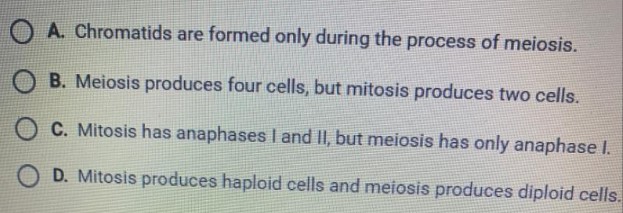QQuestionBiology
QuestionBiology
How are meiosis and mitosis different?
# A. Chromatids are formed only during the process of meiosis.
B. Meiosis produces four cells, but mitosis produces two cells.
C. Mitosis has anaphases I and II, but meiosis has only anaphase I.
D. Mitosis produces haploid cells and meiosis produces diploid cells.
Attachments

6 months agoReport content
Answer
Full Solution Locked
Sign in to view the complete step-by-step solution and unlock all study resources.
Step 1I'll solve this problem by comparing meiosis and mitosis systematically:
Step 2: Understanding Cell Division Types
- Mitosis is a process of cell division that produces two genetically identical diploid daughter cells - Meiosis is a specialized cell division that produces four genetically unique haploid cells (gametes)
Final Answer
Meiosis produces four cells, while mitosis produces two cells.
Need Help with Homework?
Stuck on a difficult problem? We've got you covered:
- Post your question or upload an image
- Get instant step-by-step solutions
- Learn from our AI and community of students